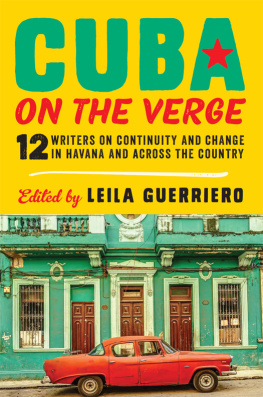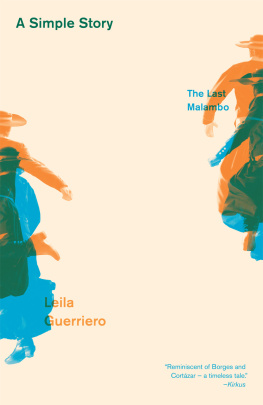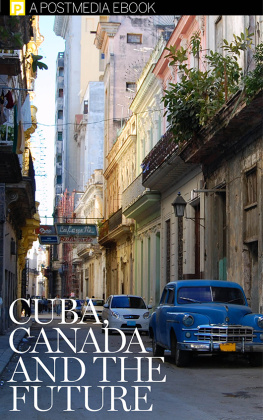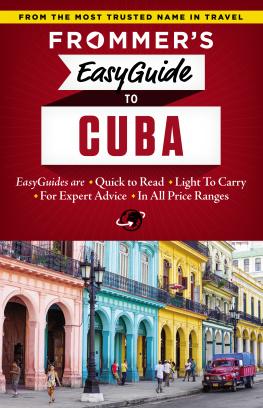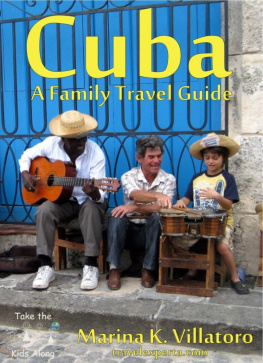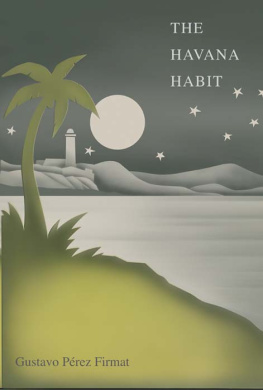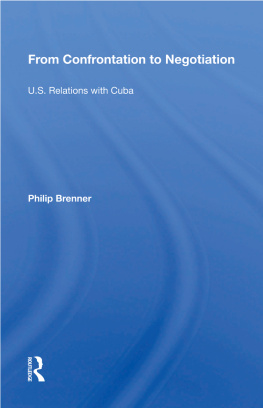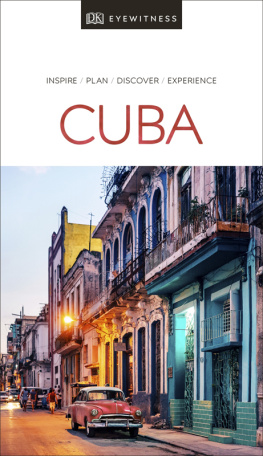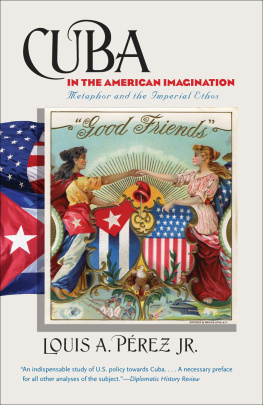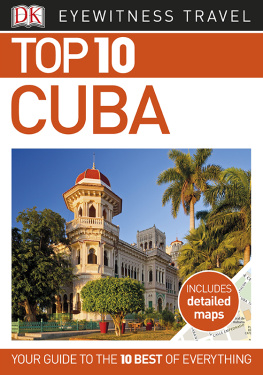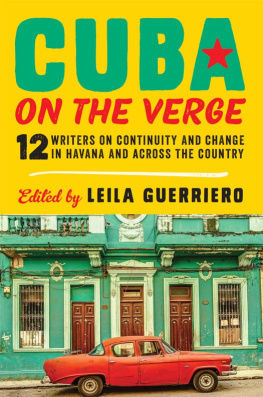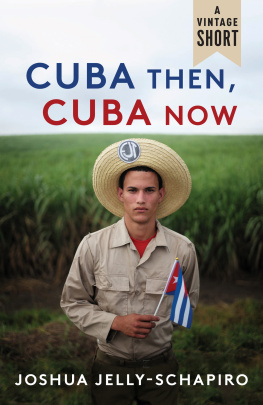O f all the questions that journalism must ask (who, what, where, when, why, and how), theres only one that can be answered easily when we talk about Cuba: where. Everyone more or less knows where Cuba is. When it comes to the rest of the questions (What is Cuba? Who are the Cubans? What is Cuba like? When did Cuba start being what it is? Why is Cuba the way it is?) and the different variations and combinations of those questions, not only are there no easy answers, but everyone seems to have their own.
For some, Fidel Castro is a wise and admirable hero, but for others he is a tyrant who led a dictatorship for decades. For some, Cuba is a paradise made of palm trees, sun, and sea, with education and health care for all, while for others its a country constantly suffering from shortages, filled with unbelievably smart biologists and architects working as taxi drivers. For some, Cuba is a model of equality and justice, but for others it is a place that sneakily replicates the blights of the West (corruption, the class system, social inequality). For some, its a fantasy island. For others, its a prison.
The twelve essays that make up this book try to distance themselves from these oversimplifications and, in telling us about this country, cover terrain that is much more dangerous, and also more interesting: that of doubt and contradiction. The journalists and writers who have participated in this volumenon-Cubans living in Cuba, Cubans who live in Cuba, Cubans who have left Cuba, non-Cubans who have visited Cubaare writing about a country whose population has been educated in the most fervent atheism but also avidly drinks from the cup of African religions. A country for which the United States is an overbearing nemesis but which also carries baseballthe American sport par excellencedeep in its DNA. A country where women are queens and mistresses of their bodies (Getting a curettage [abortion] done in Cuba is much more common than going to the dentist, writes Wendy Guerra), but where none hold a position of power, not even as the wives of its leaders. An abyss lies between Fidel and a naked woman, Guerra writes.... The current president of Cuba, Ral Castro, is the widower of Vilma Espn, also a revolutionary fighter. He is said to be a family man, but no one knows anything about his life today. As for the female figures relationship to Cuban heroes, leaders, and rulers, she isnt even in the background. She simply doesnt exist.
Leonardo Padura writes an ode to baseball, lamenting the advance of soccer over the sport that he once wanted to play professionally, and asks what will happen to the Cuban identity in the face of this and other changes.
The actor Vladimir Cruz remembers how, in 1993, in the most difficult moment of the Special Period, he arrived in Havana as a twenty-seven-year-old with two hundred Cuban pesos in his pocket:
I had wanted to make it to the capital with my feet on the ground, and in effect there I was, but instead of my feet I had my back on the ground in the capitalon the floor of the capitals bus terminal, that is.
I slept a bit and opened my eyes at daybreak, when the terminal opened. I got up, washed my face with a tiny trickle of water that dripped into the sink of the dilapidated and fetid bathroom.
That morning he won a breakout role in the movie Strawberry and Chocolate, and, though he was able to pursue his vocation in large part because of enormous support from the state, it was that same state that, with whimsical arbitrariness, prevented him from doing things such as attending the Oscar ceremony in 1994 when the movie was nominated for best foreign film.
Abraham Jimnez Enoa paints a vivid portrait of Ernesto, a jinetero, a man whose principal tool in his work is sex with foreign women.
Carlos Manuel lvarez makes clear that emigrating, more than just leaving, means ripping a country from ones body, as he recounts his 2015 visit to his father who had recently emigrated to Miami, a man who in Cuba had been a doctor and now works knocking coconuts from trees in the gardens of luxurious homes belonging to others.
Ivn de la Nuez wonders where Cuba is headed (after Obama and the pope and the Rolling Stones and the fashionable cafs and the Havana streets transformed for the set of The Fate of the Furious) and what road he traveled to arrive here.
An American, Francisco Goldman, returns to the stage he visited decades earlier, the Tropicana, the capitals most iconic nightclub, and follows in the footsteps of a glorious past that no longer exists, or exists only in part, or exists in a different way.
The Spaniard Mauricio Vicent explores the history of the bolita, an illegal lottery brought to Cuba by the Chinese, in which numbers are associated with certain animals, people, or things, unveiling a sophisticated system of bets that brings together magic, poetry, the interpretation of dreams, and, of course, ambition.
On one of his first visits to Havana, the Mexican Rubn Gallo got to know Eliezer, the bookseller whose story he tells and in which converge different forms of sensuality, the tricks used to cheat the censors, and his expectations for the immediate future.
In Mi Amigo Manuel, Patricia Engela Colombian American living in the United Statestells us about the driver of an almendrn, the name for the classic American cars from the fifties that are sometimes turned into taxis. A man who seems to have crossed the threshold into all kinds of resignation, he works fifteen hours a day, he only rests on Sundays, and he says he would never leave Cuba, not for love of country but because he doesnt want to abandon his mother.
The American journalist Jon Lee Anderson recalls his experience living in Cuba with his family during the Special Period, as he conducted research for his biography of Che Guevara, and notes the contradiction between the hardships of the locals, forced to live with very little, and his privileged position as a foreigner.
The Chilean Patricio Fernndez, using the background of a grim yet luminous cockfight, writes about the tensions that have rippled through the turbulent ocean of the Revolution:
The Revolutions great conquest was of time. Cubans are not in a hurry. The time agreed on for an appointment is only an approximate reference. Since public transportation is unpredictable, delay is easy to understand. Whats more, little is lost by waiting. People who work assiduously are rare. Since the salary fixed by the state is around thirty dollars a month, chatting on the corner is almost as profitable as exerting yourself in a profession. More is obtained por la izquierda, or to the left (commissions, bribes, and all kinds of kickbacks that function at the edges of institutionality) than by obediently exercising a trade. When it came time to produce, the communitys well-being turned out to be a much less convincing motivator than personal benefit. Efficiency disappeared the moment profit was forbidden. And with it, haste. If capitalisms success has led to a growing self-sufficiency, socialisms failure consolidated the need to rely on others in order to survive.
To retell the history of Cubalike recounting the invasion of Normandy or the fall of the Berlin Wallis to recount History with a capital Han ambitious job. Here are twelve attempts.
Leila Guerriero
BY CARLOS MANUEL LVAREZ
TRANSLATED BY ANNA KUSHNER
A t the end of May 2015, I landed in Miami from Havana. I must have been one of the few Cubans who had ever set foot in that city not to migrate definitively, but only to visit. My plan was to spend two months with my father, Manolo, who had arrived a year and a half before to rebuild his life from nothing.

